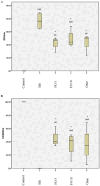Fish oil ameliorates ethanol-induced gastric injury in rat by modulating gene related to apoptosis
- PMID: 38486044
- PMCID: PMC10940715
- DOI: 10.1038/s41598-024-56647-5
Fish oil ameliorates ethanol-induced gastric injury in rat by modulating gene related to apoptosis
Abstract
Gastric ulcers are a type of digestive disease that can severely affect a person's quality of life. Our study aimed to investigate the effects of fish oil on ethanol-induced gastric ulcers in rats, with the purpose of providing more comprehensive information on the topic. The study looked at various factors such as gastric ulcer index, and nitric oxide (NO) levels in stomach tissue. To investigate apoptosis, the mRNA levels of Bax, Bcl-2, and Caspase 3 were analyzed. The results showed that fish oil can reduce gastric acidity and the gastric ulcer index in cases of ethanol-induced gastric ulcers. It was found that fish oil can increase NO levels and improve the anti-apoptotic system by increasing the expression of Bcl-2 while decreasing the expression of Bax and Caspase 3. In general, the study demonstrates that fish oil can protect the stomach from ethanol-induced damage by reducing the apoptosis pathway via nitric oxide.
Keywords: Apoptosis; Ethanol; Fish oil; Gastric injury.
© 2024. The Author(s).
Conflict of interest statement
The authors declare no competing interests.
Figures





Similar articles
-
Gastroprotective and ulcer healing effects of nitric oxide-releasing non-steroidal anti-inflammatory drugs.Dig Liver Dis. 2000 Oct;32(7):583-94. doi: 10.1016/s1590-8658(00)80840-3. Dig Liver Dis. 2000. PMID: 11142556
-
Gastroprotective effect of gallic acid against ethanol-induced gastric ulcer in rats: Involvement of the Nrf2/HO-1 signaling and anti-apoptosis role.Biomed Pharmacother. 2020 Jun;126:110075. doi: 10.1016/j.biopha.2020.110075. Epub 2020 Mar 13. Biomed Pharmacother. 2020. PMID: 32179202
-
Protective effects of friedelin isolated from Azima tetracantha Lam. against ethanol-induced gastric ulcer in rats and possible underlying mechanisms.Eur J Pharmacol. 2015 Mar 5;750:167-75. doi: 10.1016/j.ejphar.2015.01.015. Epub 2015 Jan 22. Eur J Pharmacol. 2015. PMID: 25617794
-
The therapeutic effect of different cumin essential oil fractions against gastric ulcer in rats.J Food Sci. 2025 Jan;90(1):e17572. doi: 10.1111/1750-3841.17572. Epub 2024 Dec 17. J Food Sci. 2025. PMID: 39690115
-
Beneficial effects of capsiate on ethanol-induced mucosal injury in rats are related to stimulation of calcitonin gene-related Peptide release.Planta Med. 2012 Jan;78(1):24-30. doi: 10.1055/s-0031-1280217. Epub 2011 Sep 16. Planta Med. 2012. PMID: 21928164
Cited by
-
Protective effects of vincamine against ethanol-induced gastric ulcer by attenuation of IL-6, IL-1β, and TNF-α mRNA expression levels in the gastric mucosa of BALB/c mice.J Mol Histol. 2025 Mar 5;56(2):100. doi: 10.1007/s10735-025-10374-x. J Mol Histol. 2025. PMID: 40038147
References
-
- Ramirez-Ramirez V, Macias-Islas MA, Ortiz GG, Pacheco-Moises F, Torres-Sanchez ED, Sorto-Gomez TE, Cruz-Ramos JA, Orozco-Aviña G, Celis de la Rosa AJ. Efficacy of fish oil on serum of TNF α, IL-1 β, and IL-6 oxidative stress markers in multiple sclerosis treated with interferon beta-1b. Oxid. Med. Cell. Longev. 2013;2013:709493. doi: 10.1155/2013/709493. - DOI - PMC - PubMed
MeSH terms
Substances
LinkOut - more resources
Full Text Sources
Research Materials

